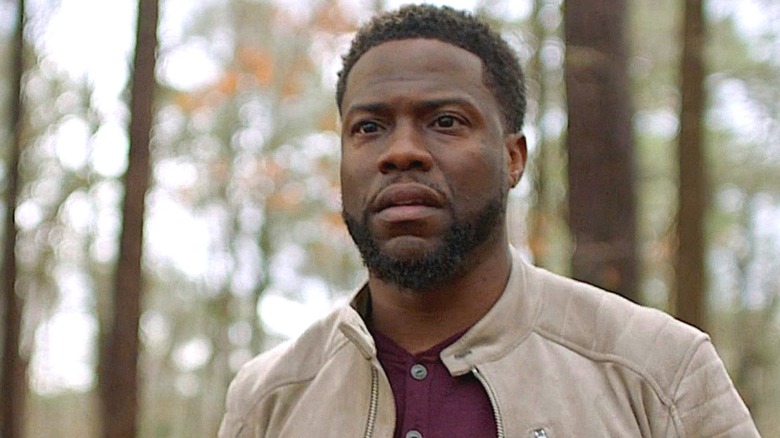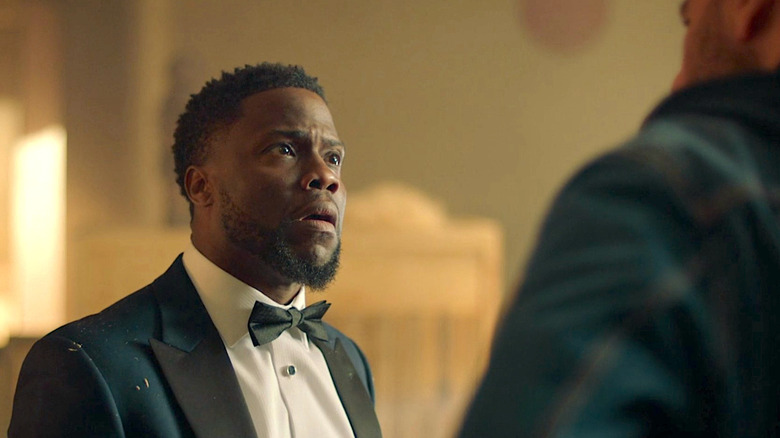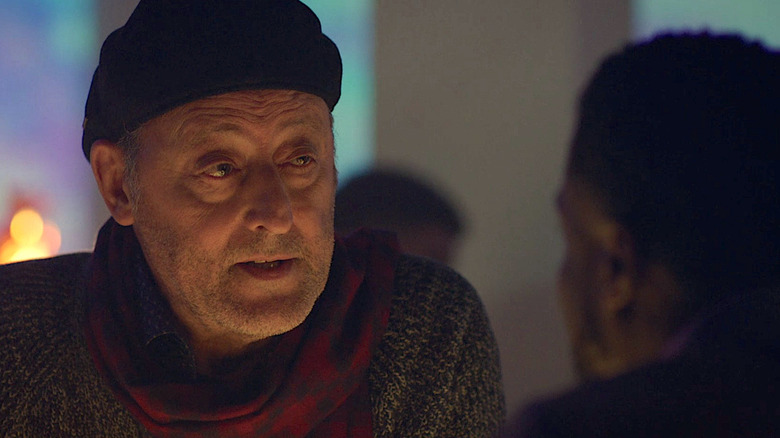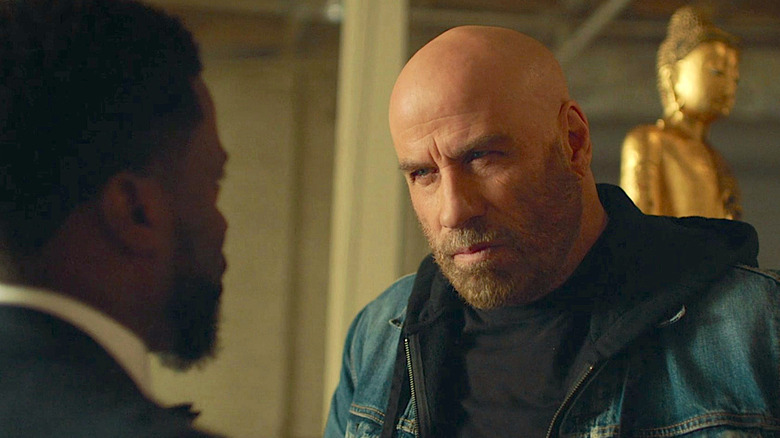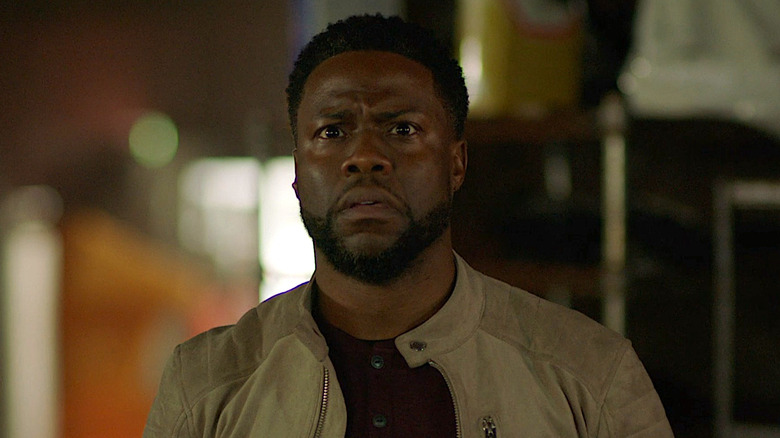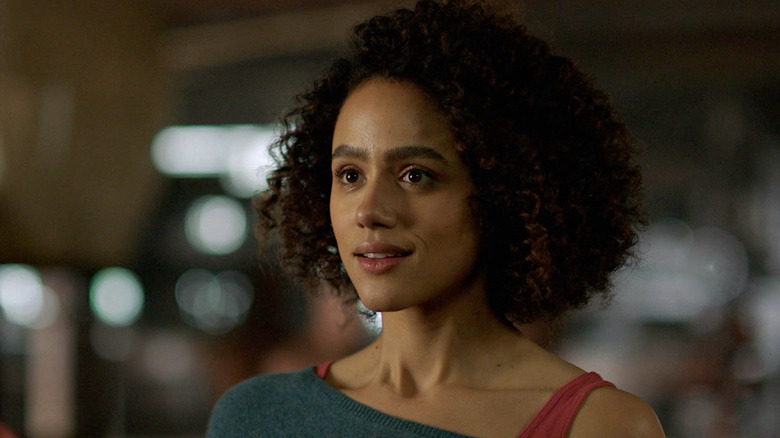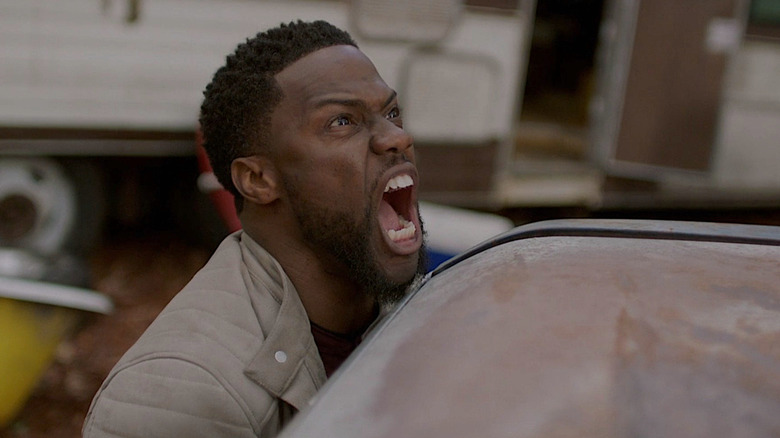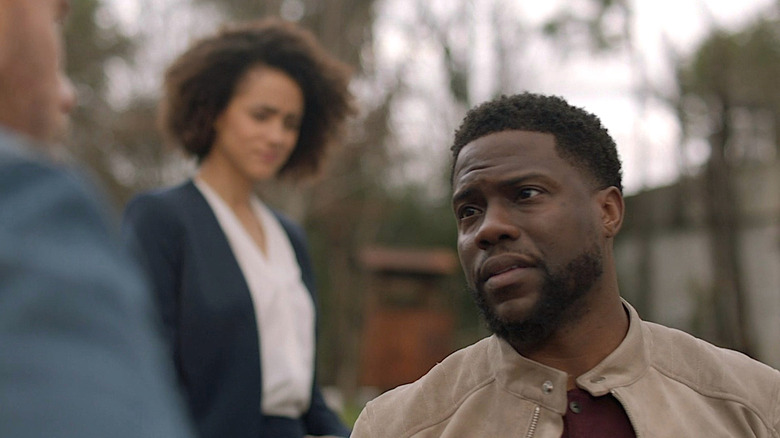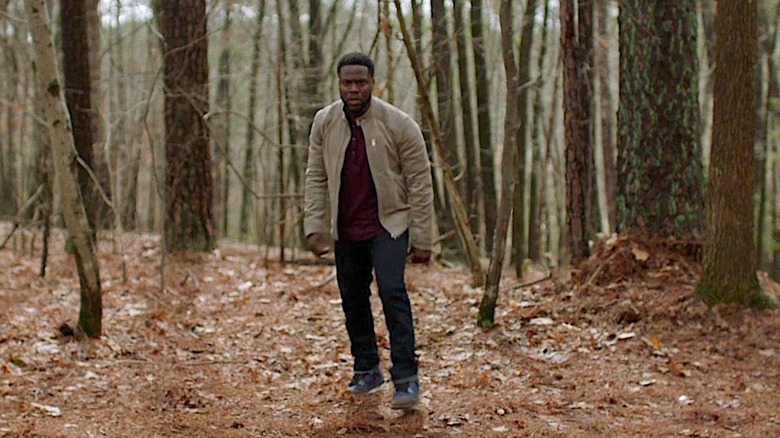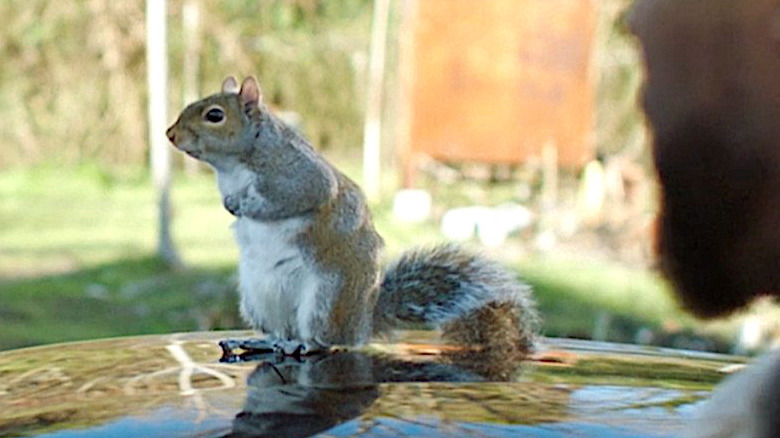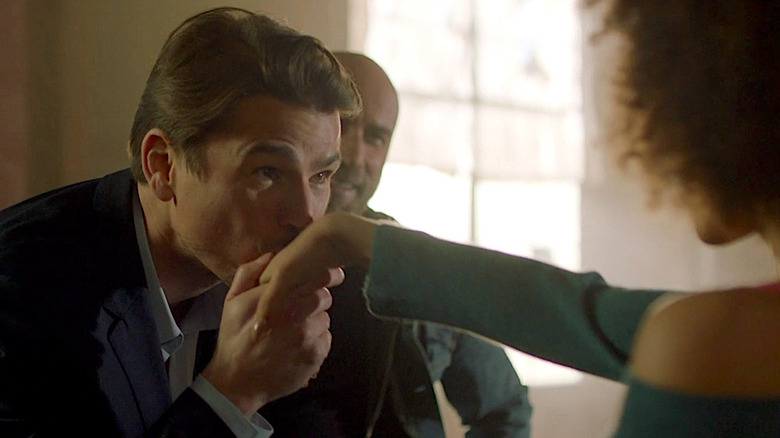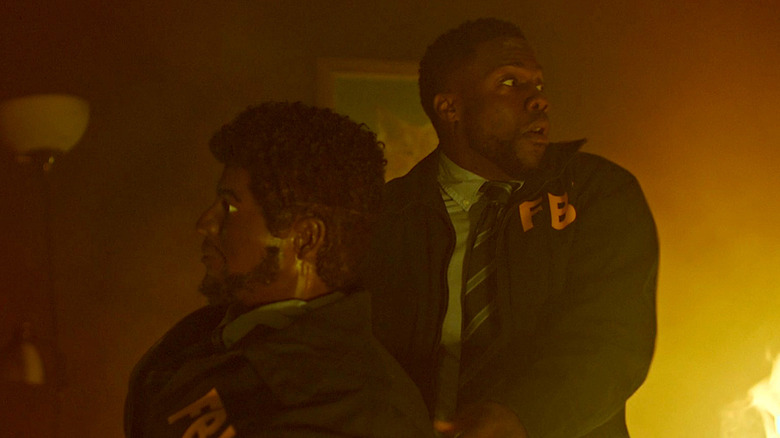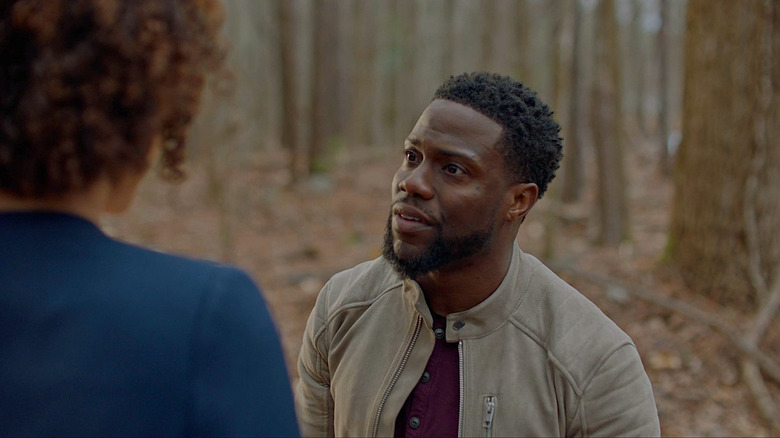The Ending Of Die Hart: The Movie Explained
They say pressure makes diamonds, but a "Truman Show"-style action star school makes Kevin Hart a leading man in "Die Hart." The Amazon Prime movie is a reimagined version of the Quibi (then Roku) series of the same name, and stars Hart, John Travolta, and Nathalie Emmanuel as a zany bunch of sort-of true action heroes.
Created by Tripper Clancy ("I Am Not Okay with This") and Derek Kolstad ("John Wick"), the film follows a fictional version of Kevin Hart on a quest to shed his sidekick image on and offscreen. Hart has to reckon with his own insecurities and a whole mess of real and fake adversaries — plus Josh Hartnett — to test his mettle.
The movie is a lighthearted look at how painful it can be to feel overshadowed — even when you're America's Funny Man, Kevin Hart. Like any meta-movie worth its salt, there are references to Hart's real life, "Ride Along 2," and Macho Man Randy Savage's secret Slim Jim stash. While the movie never answers all of our questions about Ron Wilcox's Action Star School, we've fought our way through most of its secrets so you can enjoy the ending of "Die Hart: The Movie."
Seriously funny
Kevin Hart, the very meta main character of "Die Hart," just wants to be taken seriously. He longs to be a leading man in his own right, but can't quite hack it at the start of the movie for a number of real (and sort of real) reasons. The real Kevin Hart has made a name for himself as a comedic heavyweight with a featherweight frame. He is known for sidekick roles, especially in his many films with Dwayne "The Rock" Johnson.
The real Kevin Hart is also no stranger to hard work — just take a glance at the credits listed on his IMDb page to get a sense of his output. However, he's also no stranger to controversy. It's safe to say his experiences as a funny little guy and someone who needs to prove himself after some very public errors might have inspired his "Die Hart" performance.
Make no mistake — "Die Hart" is a silly action comedy, and we don't say that pejoratively. While it's light entertainment, it does touch on some legit heavy topics like self-loathing, self-limiting, and an unfounded fear of squirrels. While the movie treads familiar action-comedy ground and sometimes repeats itself (due in part to its origins as a Quibi series), including even a little exploration of personal growth in comedy is refreshing.
Sidekicked in the teeth
No one seems to believe in Kevin Hart's action hero dreams, and even though early in the movie Hart pays lip service to those dreams, he doesn't believe in himself, either. Hart is always funny, rattling off jokes and asides, but he's also always tense — insecurity coiled in a petite, powerful frame.
This lack of belief and surplus of bravado and venom is the problem that haunts Hart throughout "Die Hart" — at least until he proves to himself he can be the kind of man he wants others to believe he can be. Heady stuff for a movie that was once a Quibi series, but also plain and simple. Hart wants to be seen as a hero, not just his high-strung sidekick persona. He's so hungry for external validation that he agrees to be "found" by someone else rather than working to find himself on his own terms. Famous action director Claude Van de Velde (Jean Reno, the professional from "Leon: The Professional") is eager for the task.
Van de Velde is frustrated with the commercial nature of his action films, and recognizes similar self-loathing in Hart. It's what draws Van de Velde to Hart, and makes the idea of going into the middle of nowhere with no cell reception and a crazed John Travolta seem so appealing. Hart's dissatisfaction with being a sidekick speaks to the idea of how we can all be saddled with others' preconceived notions of our own potential. We, like Hart, might also long to take drastic measures to escape being typecast as the proverbial goldendoodles in search of mischief.
Coach Ron
Coach Ron is the villain of "Die Hart", but John Travolta's delightfully unhinged performance is a work of comedic heroism. Coach Ron is aggressive, confusing, and cringe-inducing when it comes to safe sets. It's safe to say Coach Ron is the living nightmare of all intimacy coordinators, as well as Kevin Hart. Coach Ron has many seemingly fake things to say about Matt Damon and his training program, as well as some very real violent tendencies. What's true, what's false, and why is he so fixated on Kevin Hart?
If Van de Velde's undercover action movie is the crucible that creates a more confident Kevin Hart, Coach Ron is the rickety card table that crucible is resting on. Coach Ron is chaos. If anything represents anything in an action comedy, Coach Ron represents the senselessness and unpredictability of a life all heroes and sidekicks must withstand. Coach Ron is a storm to be weathered. If Kevin Hart is tightly wound and emotionally pent-up, Coach Ron is a pure, volatile expression of action and emotion. He is mystery and punishment in a black hoodie and a denim jacket. He is also a loose end.
While we know Coach Ron is in on Van de Velde's plan and an actor of sorts, we never fully learn what Coach Ron does when he isn't pretending to make Kevin Hart's life really miserable. How much did he have to do with making Matt Damon a star? Is he really the godfather to Josh Hartnett's kids? We suppose these are questions they'll answer in the sequel, "Die Hart 2: Die Harter."
Leveling up
At the beginning of "Die Hart," Kevin Hart fronts like he's ready to lead, but it soon becomes obvious that he needs to learn how to take charge instead of just spit catchphrases. Claude Van de Velde plans to "find" Kevin Hart by filming his real reaction to dangerous action scenes disguised as training from Coach Ron. But while Kevin Hart does learn how to be an action hero, it isn't because he follows the track laid out for him by these two men — it's because he blazes his own trail.
Van de Velde and Coach Ron think they're coaching the best out of Hart my tricking him into stabbing or seducing his co-star Jordan. They think sending him into a burning building to save his mini-me, Lil Kev, is getting the best performance they can out of him. Of course, no amount of jumping into the fire or out of a building is proof of personal action hero growth — but bonding through defiance totally is.
Hart refuses to accept the shady circumstances of his training, and uses every opportunity he isn't being watched to surprise himself and his de facto captors. By defying his own expectations and Van de Velde's plan, Hart learns how to take real action — even if, in the end, the circumstances were all faked.
Getting the girl
Kevin Hart starts out very into the mysterious actress Jordan (Nathalie Emmanuel), who arrives at Ron Wilcox's Action Star School with a similar dream. Jordan wants to leave her career as a sitcom star behind to be an action hero. Just like Hart, she'll do whatever it takes to turn her career into one where she's taken seriously. Jordan is the real action hero of "Die Hart," much to Hart's initial jealousy and dismay.
But when Hart stops focusing on how Jordan is better at basically everything than him, he starts to forge his own path. He learns to trust his instincts by breaking into Coach Ron's office, and to listen to the instincts of others by slowly learning to pay attention to Jordan. Even when the first jig is up, Hart starts to make his own leading man moves instead of standing on the sidekick sidelines.
He stops being insecure about Jordan's action prowess, and ultimately learns to understand her frustrations as an actress seeking legitimacy instead of just seeing her as a potential crush. They work well as a team, even when she betrays him as part of her paid acting gig — and even if Hart still seems to crush on her harder than she crushes on him.
Fake it til you make it
Early in "Die Hart," Coach Ron swipes Kevin Hart's phone and Hart tosses off a comment about how he needs it to run his empire. In real life, Hart does lead an entertainment empire in addition to being "America's Funny Man." He even has his own podcast, Comedy Gold Minds. So it's Hart-ening (we're not sorry) that someone as accomplished as Kevin Hart can also suffer from insecurity. Action-comedy stars — they're just like us!
Hart's "Die Hart" character is in desperate need of a confidence boost. While Coach Ron's methods are confusing at best and lethal at worst, Hart gets a real opportunity to prove himself to himself in the woods surrounding the warehouse. When Hart saves the "Deliverance" guy without having to call anyone else for help, he legitimizes his own action star potential. He has no choice but to be at his best, and following his instinct to help proves he has what it takes to be who he wants to be. Of course, the event is staged — not that Hart knows that yet.
The scene plays less like a bummer moment and more as a hilarious reminder that we all need a fuel injection of feeling like we can pull off something difficult, so that we can do the real deal later. So what if that moment is provided by an actor pretending to be crushed by his own truck? Just like Kevin Hart, we've got to take the wins where we can.
Things get real
Josh Hartnett "dies" and the jig is up. Kevin Hart's suspicions were right — Coach Ron really is in trouble with a drug dealer named Rodrigo. Coach Ron reveals that his Action Star School is really a ruse for Van de Velde's secret film. Hart reels from the revelation, but can't stay angry too long, because he has to comfort Coach Ron.
Even though he's spent the rest of the movie bent on taking Coach Ron down, as the man confesses to making a terrible mistake, Hart gives us a sense of his heroic qualities that go beyond action movie training. Hart advises Ron to tell the truth about what he's done and own up to mistakes, as Hart himself has done. That's when the movie gets extra meta. While Hart hasn't offed any drug dealer's nephews as far as we know, he's had his share of scandals. Unlike many men in his position, he's also publicly commented on how his initial response was wrong.
"I missed an opportunity to say simply that I don't condone any type of violence in any way, shape or form to anyone for being who they are," he says in his Netflix special (via The Hollywood Reporter.) "Instead I said, 'I addressed it.' I said, 'I apologized.' I said, 'I talked about this already.' I was just immature." The energy and remorse from real life translates to Hart's screen role here as he urges Coach Ron to own up and apologize. It's a rare stance for someone who could have been "canceled" to take, and Coach Ron takes Hart's advice — and, since this is a comedy, is "killed" for doing so.
Making the jump
The only thing stopping Kevin Hart from becoming the Kevin Hart he wants to be is a leap of faith. Simple —and stressful — as that. Hart needs to take that leap, but he couldn't do it at the beginning of the movie. Instead, he chickens out, stumbles off a roof, and screams like the sidekick everyone else is convinced he'll be forever.
Even though Hart's head might think he's ready to be an action star, and his muscles prove he has what it physically takes, his heart is nowhere near in the task the first time he has a big jump to make — so why is it such a big deal that Hart takes an even bigger leap of faith at the end of the movie?
Hart is able to make the climactic jump because he's not just making it to prove himself. The first jump was really just a failed attempt to massage his wounded ego. The second jump was to get to Jordan — and fine, save himself from certain death at the hands of Rodrigo. Even though Jordan far outshines Hart in the action star department and clearly doesn't return his crush, he's learned to be her action co-star, and not just her bitter comic sidekick.
Squirrel friends
In the beginning of "Die Hart," Kevin Hart is gently teased on a morning talk show about his "fear of woodland creatures." Early-movie Hart is insecure and easily wounded, and the mere mention of squirrels makes him defensive. When he arrives at Ron Wilcox's Action Star School, he even serves up sass to a squirrel on his car.
It's not too nutty to make the case that Hart has beef with the squirrels because he has beef with himself. Hart is a microprince frustrated with how he is misunderstood, and so he, in turn, misunderstands the microprinces of the forest. However, as the movie progresses — and Hart gains confidence in both his newfound action chops and relaxes his overly tense jealousy muscle — he opens up to let the right squirrel in.
We know you're screaming that this squirrel can't be a metaphor for self-love and personal growth, but you can bet your bottom acorn it is. So does Hart. When it seems like all the chips are down and even a newly-better Kevin Hart can't take down the deadly Rodrigo, Hart gets a big assist from a perfectly-timed squirrel — and audiences get a big reminder to show a little love to any scraggly little woodland creatures in their soul.
We Heart Heart-Nett
Josh Hartnett is many things Kevin Hart is not — namely, super tall — which is why the 6-foot-3-inch "The Faculty" star's cameo as a delightfully obnoxious version of himself really gets under Hart's skin. While Hartnett isn't exactly a traditional action star, "Black Hawk Down" and "Pearl Harbor" show he knows his way around a war film. He even mixes it up with vampires in "30 Days of Night." "Die Hart" defines Hartnett's action prowess as being a result of Coach Ron's guidance. This agitates Hart's fears that others will never believe he can achieve true leading man status.
Hart to Hartnett — while the name of a hypothetical comedy mystery series we would totally watch — seems like an unlikely transformation. It's hard enough to try and change into the kind of person (or beloved superstar) you want to be — but who wants to do it in the shadow of Josh Hartnett? "Die Hart" never dives too deeply into any of its themes, but the Hartnett cameo (and his attendant license plate) really deliver on comparison being the thief of joy.
Whether Hart (or by proxy, the audience) gives an eye roll to Hartnett's major game with Jordan or his adorably annoying license plate, his presence ratchets up Hart's insecurity — and later, to avenge Hartnett's death, his action star game. But while everything about Hart's "action movie" experience is revealed to be part of an elaborate attempt to make him the star he's always wanted to be, Hartnett's death in the movie is very real. The "film" is even dedicated to his memory. It's a blink-and-you'll-miss-it moment of supremely dark stunt-related "comedy."
Lil Kev, where art thou?
"Die Hart" takes a light touch with its themes, but one definite theme is to trust your instincts, most of the time. Of course, if Kevin Hart listened to his gut when he first caught sight of Lil Kev, he would have left Action School and without learning one of its most valuable lessons — like how saving a doll made in your own likeness can teach you how to save yourself from burning off the rest of your career by playing talking dogs.
There's something deranged and tender in the sight of a famously tiny funny-man lugging around an even tinier version of himself, especially when that version looks like a haunted puppet. Lil Kev spouts real Kevin Hart's catchphrases, and depends on others to guide him to safety, just like the movie's version of the real Kevin Hart.
Throughout the course of the film, Hart learns to take charge of situations and himself, in addition to caring for the literal personification of his inner child/FBI agent. While this proves that apt metaphors can be found anywhere, let it be noted that Lil Kev does disappear in the final act of the movie, and no mention of him is made again. There's probably another metaphor in there somewhere — and may we suggest a possible "Die Hart" and "M3GAN" crossover rom-com?
Not-so-zero to hero
Kevin Hart doesn't start "Die Hart" as a nobody — far from it. Still, Hart starts the movie lacking the confidence to really be a team player. He's jealous of Dwayne Johnson's success, he's scared of squirrels and jumping across large chasms, and he's tempted to take the easy and agreeable road to a steady, animated-dog-movie paycheck.
Hart is very focused on himself at the start of the film, but by the end of "Die Hart" he knows no man is a failure who has friends — and no leading man is anyone without co-stars. Kevin Hart becomes the action hero he wants to be in the world, and does it by acknowledging two truths: he can't do it alone, and he has to be his own kind of hero.
"Die Hart" is a light comedy, but successfully blends soul-searching with silliness to pull off its heartfelt message. Of course, the movie immediately counters its heartfelt finale moment with a joke about who will get top billing in Van de Velde's film. Even though the conclusion of the series-turned-movie is sweet and silly, there are some flickers of "serious" acting throughout. We might yet get more action and drama from Kevin Hart — but he'll always make us laugh.
